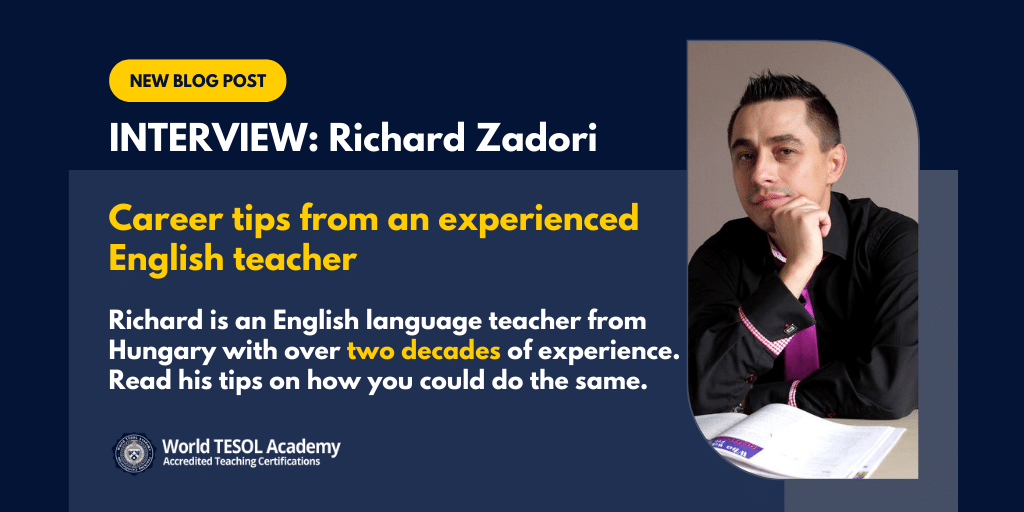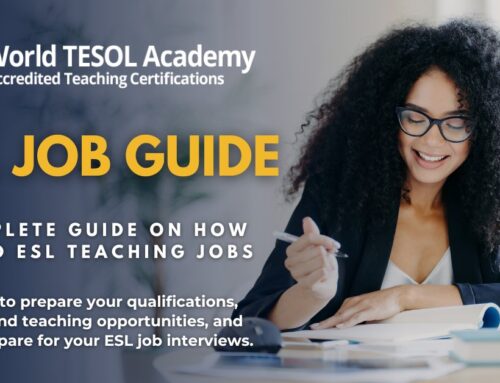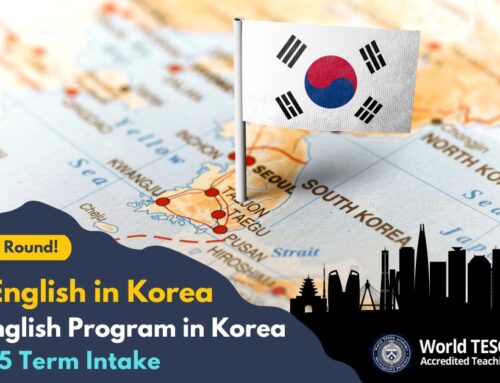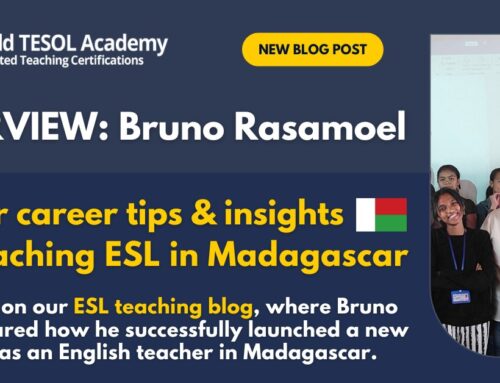
Meet Richard: Experienced English teacher from Hungary with a passion for the English language and teaching
Richard is an English language teacher with over 20 years of experience. In this article, he shares his views on the ESL teaching industry along with advice on how you can maintain your professional development throughout your career.
It’s not uncommon for new teachers to view this as a temporary career choice, thinking that it’s impossible to build a successful and long-lasting career teaching English. This is of course not true. It’s more than possible to build a successful English teaching career so long as you are able to maintain your professional development, while also keeping yourself motivated.
A great step towards building a successful career is to pursue further education. There are several different paths that you could take as a professional English teacher. Many teachers prefer to pivot themselves towards specific types of learners, while other teachers might focus on specific destinations, or even online. Whichever direction you decide to take, it’s essential that you possess the necessary certifications and training.
Richard has been teaching English as a non-native-speaking teacher for over two decades. Throughout the years, he’s pursued a variety of qualifications in order to excel at what he loves the most – teaching English.
Below, he’s shared his views on the ESL teaching industry and his best tips on how you can build a successful career. Let’s hear what he has to say!
About Richard
Richard is a Hungarian English teacher that has been active in the teaching industry for over two decades. With a passion for languages and teaching, he’s taught English in a variety of settings to learners of varying levels.
Name: Richard Zadori
Nationality: Hungarian
Profession: Private tutor and content creator
Experience: 20 years
With a real passion for languages and teaching, Richard hopes to be able to visit many parts of the world while doing what he loves the most – teaching English.
Richard’s interview:
💬 What made you decide to start teaching English?
“Michael Jordan and Tupac Shakur. Really, I wanted to understand what they were saying. I also realised that this language is very important because it is the lingua franca of the 21st century, and if someone learns this language they will be understood anywhere in the world.”
💬 What type of students do you prefer to teach?
“Adults, definitely. But I might try my hand at teaching children or adolescents.“
💬 Are you currently teaching in person or online?
“I teach in person and online as well. I also teach hybrid classes (some learners are in the classroom, and some of them are online during the same lesson).”
💬 Hybrid classes sound like quite the challenge. What’s the key to success when teaching hybrid classes?
“Hybrid classes are sometimes highly demanding. In order to succeed, you need to excel at multi-tasking, and have almost impeccable organisation skills. The teacher needs to concentrate all the time, and also meet the needs of the learners while teaching them effectively.”
💬 What kind of teaching qualification do possess?
“Throughout my career I’ve obtained the following teaching qualifications: 120-hour TESOL/TEFL, TESOL/TEFL Level 5, TESOL/TEFL Level 7, MA in TESOL/TEFL, TEYL, TEAL, TBE, TEO, IELTS teacher, Advanced Grammar, Grammar for Teachers, CELA Test, CELTA, Ba in TEFL (from a Hungarian University).”
💬 Would you recommend others to pursue an English teaching certification like a 120-hour TESOL/TEFL certificate?
“Yes, definitely, because a myriad of companies require you to have this type of certification. Also, if someone wants to move to a different country, it is pivotal to prove their expertise.”
💬 How do you maintain your professional development?
“I am an avid learner of the English language. I eat, sleep, dream, and breathe English 24/7. I believe that when I first saw an interview with Michael Jordan, that experience lit an eternal flame in my spirit for the English language. Then when I first heard songs by the late Tupac Shakur, I felt he was trying to convey a message to me. I delved deeper into, first US English, then later when I moved to Yorkshire, UK English – especially Northern UK’s English dialects because of my adoration towards Norse History, the “Dark Ages” and the History of the British Isles. I still watch videos and documentaries galore on youtube to get to know more and more about the English language. Also, I regularly go to a British pub here in Budapest where I put my theories and my love for accents and dialects into practice.”
💬 What are some of the main difficulties Hungarian students face when learning English?
“It is a tricky question because, generally speaking, Hungary is a very isolated country linguistically. Our language is not based on Latin, Germanic or Slavic languages. Hungarian is not an Indo-European language. This is the reason why I reckon, Hungarians learn English a tad bit slower than, let us say, a German or a Spanish person would.”
In my language, there are only 3 verb tenses while English has got 12. That is why a Future Perfect Continuous is mostly unfathomable for a huge percentage of Hungarians. We do not have phrasal verbs in our language, which is also a highly indecipherable trait of the English language for Hungarians. Prepositions also pose as Mt. Everest for many-many Hungarians.“
💬 Do you develop your own teaching material? If so, how?
“I use a plethora of textbooks, and coursebooks and I also select from them which I deem effective for learning. I also love using youtube, online tests, films, series and music lyrics – especially for exam prep groups.”
💬 What’s your best teaching memory?
“I have got a gazillion of great memories. I’m afraid that I’m unable to pick just one specific situation. There are, however, a few that I’m especially fond of, that I often think back on when in need of a small motivational boost.
A lot of my students and learners have told me that they had hated learning English but that I was able to show them how amazing, unique and paramount it is to be able to speak and understand this language is in the 21st century.
Many students have also said that I have given them a chance to start a new life, a new profession or even move to a new land of opportunities.
I’ve also heard that heeps of my students who previously had not been able to grasp English verb tenses, were able to succesfully navigate through the Seven Seas of English tenses successfully after my courses.
Being able to think back on these memories and achievements have helped me keep my motivation and passion for teaching”
💬 What’s your dream teaching destination and why?
“England. Especially the North of England, because I used to live there for 3 and a half years. Another place I would love to teach in is Spain, especially in the South of Spain. I would be happy to live and teach in Central and or South America (Mexico, Brazil or Peru). Lastly, I would also want to visit China and Japan – and if any opportunity arises, I would love to live and teach there because I have always been a fan of ancient cultures.”
Want to start your teaching career? Get TESOL/TEFL certified:
To teach English overseas and online you’ll need to have an accredited and recognized TESOL/TEFL certificate.
With World TESOL Academy’s accredited 120-hour TESOL/TEFL course you’ll develop the necessary skills needed to launch your teaching career.
Or click here to get a free preview of the course.
.
💬 In which direction do you see the ESL teaching industry heading?
“I think, and sorry for being bluntly honest, non-native teachers of English, whose command of English is exceptionally close to a native person’s, are highly discriminated against and underestimated by ESL companies. I believe that ethnicity and citizenship are not a testament to one’s teaching skills. Teaching needs plenty of intricate skills, and only possessing the privilege that one was born in a specific country, cannot make up for.
I firmly believe that international companies should open up to non-native teachers of English as well, and when their HR colleagues skim through CVs, the nationality part should not be an instant ‘Bin!’ exclamation.”
💬 What improvements would you like to see in the ESL teaching industry?
“Less discrimination and favouritism.”
💬 What kind of tips do you have for teachers that are just starting out?
“Many of my students have told me that before my courses they were often discouraged by other teachers, sometimes even mocked and lambasted. I am a person who thinks that every situation, every scenario, every motivation, every learner, and every student is different.
If what I am going to jot down now is a tip, then I would say:
- Be open to your students
- Guide them
- Encourage them
- Motivate them
- Show understanding
It does not matter how. Just do it, like Nike. If you are able to do this, there’s a good chance that they’ll developed an affection for the English language, as well as increase their command of English greatly.”
Conclusion
Building a successful career as an English teacher can be difficult if you don’t take the time to invest in your own professional development. However, if you are able to obtain the necessary qualifications and keep your motivation running high, you’ll be well-equipped on your journey toward building a long-lasting career teaching English.
In addition to your 120-hour TESOL/TEFL certificate, it can also be a good idea for non-native speaking teachers to pursue an English proficiency certificate, such as IELTS/TOEFL.
This is a great way to convince potential employers that you not only have received the proper teacher training through your TESOL/TEFL certificate but that you also possess a native level of English.
These two certifications combined will be a foundational tool for you to build a successful career teaching English, just like Richard.
If you’d like to hear more from Richard, you can head on over to his YouTube channel where he posts content related to English language learning.







Leave A Comment